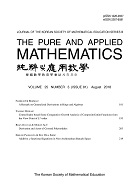 ISSN : 1226-0657
ISSN : 1226-0657
Article Contents
- 2024 (Vol.31)
- 2023 (Vol.30)
- 2022 (Vol.29)
- 2021 (Vol.28)
- 2020 (Vol.27)
- 2019 (Vol.26)
- 2018 (Vol.25)
- 2017 (Vol.24)
- 2016 (Vol.23)
- 2015 (Vol.22)
- 2014 (Vol.21)
- 2013 (Vol.20)
- 2012 (Vol.19)
- 2011 (Vol.18)
- 2010 (Vol.17)
- 2009 (Vol.16)
- 2008 (Vol.15)
- 2007 (Vol.14)
- 2006 (Vol.13)
- 2005 (Vol.12)
- 2004 (Vol.11)
- 2003 (Vol.10)
- 2002 (Vol.9)
- 2001 (Vol.8)
- 2000 (Vol.7)
- 1999 (Vol.6)
- 1998 (Vol.5)
- 1997 (Vol.4)
- 1996 (Vol.3)
- 1995 (Vol.2)
- 1994 (Vol.1)
Applications of the Schwarz Lemma related to Boundary Points
Abstract
Different versions of the boundary Schwarz lemma for the 𝒩 (𝜌) class are discussed in this study. Also, for the function g(z) = z+b<sub>2</sub>z<sup>2</sup>+b<sub>3</sub>z<sup>3</sup>+... defined in the unit disc D such that g ∈ 𝒩 (𝜌), we estimate a modulus of the angular derivative of g(z) function at the boundary point 1 ∈ 𝜕D with g'(1) = 1 + 𝜎 (1 - 𝜌), where <TEX>${\rho}={\frac{1}{n}}{\sum\limits_{i=1}^{n}}g(c_i)={\frac{g^{\prime}(c_1)+g^{\prime}(c_2)+{\ldots}+g^{\prime}(c_n)}{n}}{\in}g^{\prime}(D)$</TEX> and 𝜌≠1, 𝜎 > 1 and c<sub>1</sub>, c<sub>2</sub>, ..., c<sub>n</sub> ∈ 𝜕D. That is, we shall give an estimate below |g"(1)| according to the first nonzero Taylor coefficient of about two zeros, namely z = 0 and z ≠ 0. Estimating is made by using the arithmetic average of n different derivatives g'(c<sub>1</sub>), g'(c<sub>2</sub>), ..., g'(c<sub>n</sub>).
- keywords
- Julia-Wolff lemma, analytic function, Schwarz lemma, angular derivative
- Downloaded
- Viewed
- 0KCI Citations
- 0WOS Citations
